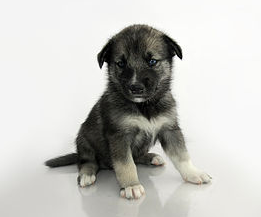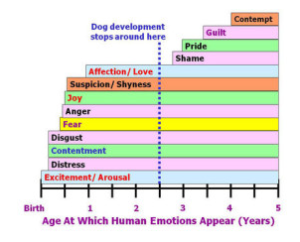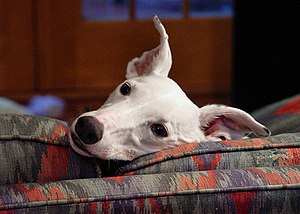Easy Potty Training Instead of Housebreaking

Teaching a dog good potty habits as well as house manners in general, is about making sure he’ll develop the habits of behavior that we’re looking for(the opposite approach of 'housebreaking' uses punishment). Building strong habits is no different than building muscles. The more arm curls we do, the stronger our biceps become. Similarly, the more the dog practices a particular behavior, the stronger the behavior will become. We can also think of it in terms of neuro-pathways getting stronger as the behaviors occur over and over again until they become habits; behaviors that are now so natural that the dog will chose them over others. Effective dog training is really about preventing the dog from behaving in ways that we don’t like and setting him up to being more likely to chose those behaviors that we do like.
In previous posts (‘Can dogs really feel guilt?’ & ‘Dog psychology trumps intuition and myth'), we showed that, despite popular belief, a dog really doesn’t have the ability to make the connection between what he did hours or even moments ago and the scolding he’ll experience as his owner walks through the door. Dogs do not feel guilt and what we think of as an expression of guilt is really an expression of fear. Research has shown that they are simply incapable from a neurological perspective to experience some of the most complex emotions such as shame, guilt and pride (Stanley Coren, 2013)(Fig 1).

If we use the muscle building metaphor, every time Rex eliminates himself on the carpet, whether he’s punished for it or not, he has experienced that behavior one more time. Where punishment(associated with 'housebreaking') often falls short, is that it fails to address the underlying problem: Rex had to pee and for whatever reason, the obvious place for him to do so was on the carpet! While scolding Rex for his deed, we still haven’t helped him develop a better habit. In the meantime, he’ll go back to what gave him relief when he needs to go again. When this happens, he has just made that behavior stronger. Scolding the dog will mostly result in teaching Rex that we can be a source of discomfort and fear and it will affect our relationship with him, without really solving the issue.
Teaching a dog good house-manners is quick and easy, provided that we put the right elements in place and take a little bit of time in the beginning. Whatever problem we’re trying to address, it comes down to making sure that the most obvious choices of behavior are the ones that we want to see him make. For that reason too, as much as possible, I choose to stay away from teaching the pup to go on newspaper or other surfaces in the house as it will only create habits that are at odds with what I’m trying to teach.
In the case of potty training, what we want our pup to do is hold it when indoors, and eliminate himself only once outside. We can even set the criteria higher and teach the puppy to go in one particular area of the yard. So the trick here is to make sure he doesn’t go inside at all, or the least possible, and that most of the times, he eliminates himself outside, in the chosen spot. If we can do this for a couple of weeks, the dog will start developing the habit of going in that spot and will starting choosing to do so on his own. Since we can predict that the puppy will most likely need to go every time he wakes up, finishes a meal or plays, we can be prepared to quickly take him out or even carry him to the allocated spot. In case of very young puppies, I’ll often go so far as taking him out every ½ hour at first (when awake of course). The puppy should be watched at all times and could if needed, be tethered to us or to our desk as a precautionary measure. It’s also much easier if we work from home or take a week or two off when adopting a young pup. Once he does eliminate himself, say 'hurry' (or any other word of your choice) then throw a party of praise and treats as soon as he's done, making that experience exceptionally pleasant and worth doing again. By repeating this sequence of events, you're establishing the habit of pottying when you ask for it and in your chosen spot.
With a very young puppy, restricting him to an X-pen whenever we can’t watch him or when we have to leave for many hours is recommended. The puppy should be confined to the X-pen, with his open crate and a potty area (newspaper or litter box). The idea is to keep him safe while restricting accidents to one area only, limiting the potential for pottying habits in other areas of the house.
If we have to leave for less than a couple of hours, crating him will help in the process, by keeping him from eliminating indoors at all. However, the key to success is to pick the right size crate and get him used to it progressively so it becomes a place of choice for him, not a source of stress. Dogs will naturally refrain from pottying where they sleep. So, ideally the crate will comfortably allow the pup to curl up and move around, but not be too big to potty in it without soiling where he sleeps can be a big advantage. The goal here is that once the house habits are well established, the crate should no longer be needed at all.
Accidents will happen; none of us are infallible. Refrain from saying anything to the dog and simply clean up the deed with enzyme cleaners. But what do we do when we catch the puppy in the act? Without a doubt, he’ll make the connection between his deed and the punishment, so isn’t that the right thing to do? I would not recommend it even in this case. The puppy may learn not to pee on the carpet, but he’ll mostly learn to refrain himself when we’re around. So it can sometimes work, but we’re taking the risk of teaching the dog to potty in the other room or as soon as we leave, making it harder to break the habit. For better success it’s much more effective to simply interrupt him by picking him up and carrying him outside without saying a word. After all, if he had an accident, it’s mostly because we didn’t do our job preventing it, right? The other down side of punishing the act is that we’ll be teaching our dog that we can be source of fear and discomfort, thus gradually undermining our relationship with our pet.
Like any other behavior, potty training is about building the habits that we want to encourage and preventing the dog from establishing those that we don’t want to live with. For most behaviors, a little management up front, coupled with smart reinforcement, will go a long way in setting us on the path to a fulfilling and rewarding relationship with our pet.
Jennifer Cattet, Ph.D.




Leave a comment